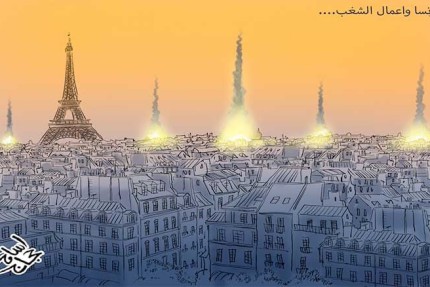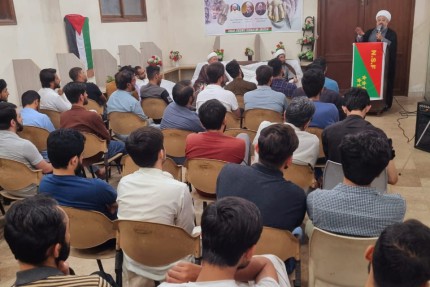Director of Negaheno futurologists and Strategic studies
The Return of the Equation of Iran’s Active Deterrence: The Zionist Regime Is Awaiting a Heavy and Historical Revenge

The recent tensions that were aggravated by the feigned Zionist regime against the Islamic Republic of Iran is considered an enemy’s uncalculated adventure.
According to Negaheno report the bombing of Iran’s consulate in Syria by the Israeli war planes that led to martyrdom of seven Iranian military counselors including two senior commanders is not a single event but it indicates that the occupying regime is trying hard to get out of an historic defeat in Gaza and international isolation and to cover up its internal crisis.
With an ancient civilization and deep- rooted history, the great Iran has remained on the geopolitics chessboard of west Asia as an international player with profound and lasting role.
Iran’s strategy that is deeply rooted in fighting oppression, seeking justice and standing against any form of occupation and terrorism is evident of a wise approach towards the policies of the region. This approach is not and has never been a transient reaction rather, it has been an active hallmark of Iran’s efforts to show it power, and to deter the opposition and to form an outcome that can be compatible with the interests and ethical and religious commitments of the Muslim nations in the axis regions such as in Gaza, Lebanon, Syria, Iraq and Yemen.
The recent strong tone of Iran’s officials that promised a serious response to these attacks is a declaration of Iran’s will for defending its dignity and interests against the moves of the occupying regime. The strong statements of Ayatollah Khamenei, the supreme leader of the Islamic revolution which promised a revenge from Israel and to transform this into a historical example depicts Iran’s commitment in protecting the Muslim nations and its allies and to form the necessary deterrence against the enemy.
The strategic depth that Iran has gained through its allies indicates a comprehensive approach that is beyond mere military tactics. This strategy guarantees a multi- dimensional strategy that has merged together political, social, and economic aspects that has given a wide scope of penetration.
This complex unity has guaranteed that Iran has a high level of capability for encountering threats and attacks in a single geographical region hence, it makes it possible to take a variety of measures for taking revenge that would go beyond direct military confrontation.
Iran’s successful revenge measures depend on its national security strategy which is principally based on deterrence. Deterrence is a type of policy of power that aims to reduce the rival’s motivation for conducting further assaults against the interests of Iran.
Iran military and political leaders are well aware of Israel’s strategy -security traps in their retaliatory reactions for due to its many failures in Gaza and its inability to destroy Hamas, Israel is trying to expand the scope and intensity of the clashes within a regional level.
Therefore, based on the warnings of the supreme leader of the Islamic revolution of Iran Israel should be looking for a destructive, abrupt and deterring attack that will change the course of history.
Since the inception of the occupying Zionist regime, the Arab military forces have failed to defeat this regime due to Israel’s unity with the United States of America. But for over 45 years Iran has endeavored to create a powerful network composed of its allies that have managed to defeat Israel in more than one cases such the 2006 war of Hezbollah and the Al-Aqsa Storm operation and have displayed their power for destroying this usurper existence in a fixed period of time.
According to the statements of the Zionist officials Iran is active in seven war fronts against Israel namely, in Gaza, West Bank, Syria, Lebanon, Iraq, Yemen and Iran itself. Therefore, in evaluating a bigger setting it is necessary to see Israel’s attack on Iran’s consulate building separately for doing so would confuse understanding the nature of contention and Iran’s comprehensive strategy.
The incidents such as the attack on Iran’s consulate building in Syria or targeting the resistance leaders in Aleppo before that is part of a series of Israel’s reaction to its major failure in Gaza, South of Lebanon and Yemen.
The general vision of the clashes in the west Asia indicates that Iran and the axis of resistance have practically prevented the US from direct intervention in the Gaza war since the 7th October and the attack on the US military base in west Asia. Moreover, the Israeli ships in the red sea have been directly targeted through logistics and information aid by the Houthis, Iran’s allies. Thus, Iran’s retaliatory reaction should be proportionate and deterring without being drawn into Israel’s trap.
Considering these points, it is obvious that Iran’s deterring strategy will be strong and effective from several areas including Yemen, Gaza, South Lebanon, Erbil and other regional areas.
Nevertheless, Iran’s deterrence in Syria requires re-evaluation due to Syria’s strategic importance as the link in the axis of resistance. Hence, Iran’s revenge should be divided into two areas:
Firstly, it should be swift, decisive and tactical in order to have effective deterrence in Syria. Iran’s potential response to Israel’s attack can be different and should reflect its strategic multi-dimensional nature.
Its options may include: a countermeasure targeting Israeli consulates, for this measure will be within the right to legitimate self- defense that are recognized by international laws and norms.
Iran’s option of cyber attacks against Israel’s infrastructure that displays its capability and tendency for getting involved in uncommon wars. The indirect military responses through its allies in Lebanon and Syria or other areas while protecting some degrees of denials or the option of intensifying nuclear enrichment programs and to use it as an instrument for strategic bargaining is another option.
The second response approach is strategic and long term; for the Islamic Republic of Iran should continue supporting its old allies and should absorb new allies that have emerged after the Al-Aqsa Storm operation whether in the occupied Palestine or in the Arab countries. The new and potential allies have reached the result that it only the axis of resistance that would destroy Israel and support the cause of Palestine.
The Iranian model for supporting its allies is a unique model that is transformed from a traditional model of supporting into an advanced and dynamic unified system. This support and change emphasize on the collective security and deterrence, for Iran is in charge of leading a coalition that consists of a variety of groups composed of governmental and non -governmental players that posses unique potentials. This axis which is now similar to an inclusive unity is ready to deal with collective security concerns, show a joint commitment for confronting future threats and show a considerable level of independence and cooperation instead of submission.
The operational vision of this axis with its military approach led by IRGC Qods force shows that training, can facilitate support of counselors and strategic assistance to the coalition groups. This strategy not only guarantees Iran’s minimum and effective footprint but also it can work in a way as to empower local players, promote their operational abilities and to bring them in the same direction with wider goals of Tehran in the interest of the cause of Palestine and the issues pertaining the people of West Asia.
The result of this approach is a fully tested diverse group of martial forces who are capable of conducting and protecting complex military actions in different regions and dramas.
Finally, it should be said that the strategic depth provided by Iran’s coalition network is a deterring factor for foreign threats and is a mechanism for projecting power that indicates Tehran’s ability in impacting the future outcomes in the region.
In principle, Iran’s strategic calculations which rely on a combination of Ideological beliefs, insistence on the liberation of Beitull-Moghadass(Jerusalem) and practical security concerns emphasize on the role of this country as a key international player and not just a regional one in forming a geopolitical vision for the middle east.
The flexibility and the compatibility of its coalition network together with Tehran’s strategic vision and the need to return an effective deterring equation in Syria guarantees that Iran should remain in the region as the key player. Iran is an international player that can pass through political confusions in the region and protect its interests at the same time and to expand its penetration in a widespread and turbulent region.
By: Mohammad Ali Senobari
Comment
- Behind the Scene of the Attack in Oman, Operating Schemes that Intend to Destabilize the Country
- Trump’s Assassination Was a Ridiculous and Pre-organized Drama
- The Syrian senior analyst Views Towards the Letter of Iran’s President -Elect to the Secretary General of Hezbollah of Lebanon
- The hard way to political agreement in France/ Will Macron remain in power?
- Navigating the Caspian: Energy, Trade, and Geopolitical Harmony
- Behind the Scene of the Attack in Oman, Operating Schemes that Intend to Destabilize the Country
- Trump’s Assassination Was a Ridiculous and Pre-organized Drama
- The Syrian senior analyst Views Towards the Letter of Iran’s President -Elect to the Secretary General of Hezbollah of Lebanon
- The hard way to political agreement in France/ Will Macron remain in power?
- Navigating the Caspian: Energy, Trade, and Geopolitical Harmony
- Holding Public Court in Damascus to Put the Zionist Regime on Trial
- Boycotting Israeli Athletes for the Olympics in France Is Indispensable
- Iraqi Media Activists Arrested in Saudi Arabia/ Using the Hajj pilgrimage for settlement with the opponents
- Syrian Journalist and Author Tabib Ahmad Al-Darzi’s Analysis on Ali Bagheri’s Trip to Syria
- What Does it Mean on the Verge of Collapse and Has Israel Reached This Stage
- We Stand in an Era of Fundamental Changes/the World’s Political Literature is Changing
- The Art of Soft Power: How Khomeini and Khamenei Used Words to Transform the World
- Mey Sobhi Khansa’s views towards the Hague court verdict and the martyrdom of I R Iran president
- Behind the Scene of the Attack in Oman, Operating Schemes that Intend to Destabilize the Country
- Trump’s Assassination Was a Ridiculous and Pre-organized Drama
- The Syrian senior analyst Views Towards the Letter of Iran’s President -Elect to the Secretary General of Hezbollah of Lebanon
- The hard way to political agreement in France/ Will Macron remain in power?
- Navigating the Caspian: Energy, Trade, and Geopolitical Harmony
- Holding Public Court in Damascus to Put the Zionist Regime on Trial
- Boycotting Israeli Athletes for the Olympics in France Is Indispensable
- Iraqi Media Activists Arrested in Saudi Arabia/ Using the Hajj pilgrimage for settlement with the opponents
- Syrian Journalist and Author Tabib Ahmad Al-Darzi’s Analysis on Ali Bagheri’s Trip to Syria
- What Does it Mean on the Verge of Collapse and Has Israel Reached This Stage




